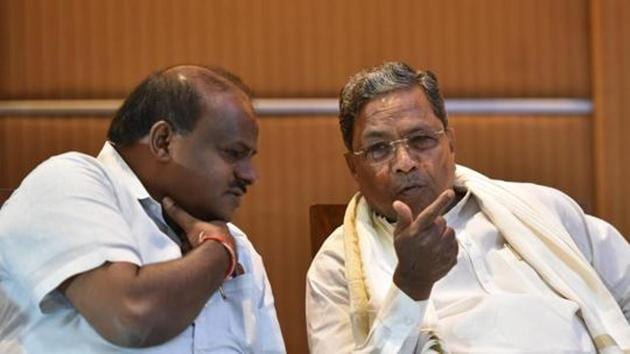‘First clarification, trust vote later’: Siddaramaiah’s twist in assembly
Karnataka Assembly trust vote: Ex-chief minister Siddaramaiah insisted that Karnataka Assembly Speaker KR Ramesh Kumar should first clarify on the Supreme Court order that seemed to bar him from issuing a whip to his legislators to attend the session and support the party.
Karnataka Chief Minister HD Kumaraswamy on Thursday opened the debate on the trust vote that he had volunteered to face in the state assembly with stinging darts hurled at the BJP but the Congress leaders soon navigated the discussion away to the nuts and bolts of the process.

Former Chief Minister Siddaramaiah insisted that Speaker KR Ramesh Kumar should first clarify on the Supreme Court order that seemed to bar him from issuing a whip to his legislators to attend the session and support the party.
“Our contention is simple. The Supreme Court order is an infringement on the rights of the party. It is our right to issue a whip. Either the Speaker or the court must clarify the status of the MLAs,” he told Hindustan Times shortly after the assembly broke for lunch.
Karnataka Assembly trust vote Live Updates
Inside, Siddaramaiah told the assembly speaker to put off the trust vote till the speaker gave a clear-cut ruling on their right to issue a whip. Or, he added, till they head back to the Supreme Court for a review. “My appeal to the speaker is that till this issue is sorted, postpone the trust vote,” he said.
Ex-minister HK Patil, also of the Congress, supported him. “The House cannot proceed without the speaker’s ruling on this matter,” he said, provoking loud protests from the BJP which cried foul.
Right at the beginning, BJP’s BS Yeddyurappa had urged the assembly to set a time-limit for the debate so that the voting could take place. That push for a deadline did prompt a comeback from HD Kumaraswamy, taunting him for being in too much of a hurry to pull down the government.
Long before the assembly met earlier this morning, Congress leaders in Delhi and Bengaluru had made it clear that Kumaraswamy would only initiate the discussion on the floor test today, not complete it. To be sure, the ruling Congress-Janata Dal Secular coalition had given a list of 26 speakers who wanted to speak on the trust vote.
This gives the Kumaraswamy government time to continue efforts to reach out to the 16 rebel lawmakers from the two ruling parties who had sent their resignation letters to speaker KR Ramesh Kumar and triggered the crisis for the government.
If the speaker were to accept all the 16 resignations, the assembly’s strength would dip to 209 and reduce the wobbly 15-month-old coalition to 101 seats. The BJP’s strength would be 105, and it is expected to be backed by one independent who has withdrawn support to the coalition.
Speaker KR Ramesh Kumar hasn’t accepted the resignations yet, prompting 15 of the rebel legislators to approach the Supreme Court. In its interim ruling, the top court gave the speaker a free hand to decide on the resignations and the disqualification petitions filed by the ruling coalition. But a bench led by Chief Justice of India Ranjan Gogoi also ruled that the 15 rebel lawmakers could not be compelled to attend or vote in the floor test.
It is this part of the order – also criticised by experts – that the Congress’ Siddaramaiah red-flagged in the state assembly. As Kumaraswamy was still speaking, Siddaramaiah told the speaker that before the assembly got down to discussing the trust vote, it would have to be spelt out if he, as leader of the Congress legislature party, still had the right to issue a whip to order all his MLAs to be present and vote in the trust vote.
From a legal perspective, Siddaramaiah stressed that the Supreme Court had infringed on the rights of the legislature party by issuing a directive which curtailed his powers though they were not parties in the case and hadn’t been heard.
An MLA who violates the whip is liable to be disqualified by the speaker.
The Congress has rested its hopes of getting the rebels to back the ruling coalition in the fear that if they are not allowed to resign but end up being disqualified under the anti-defection law, they cannot be ministers in the government during the tenure of the existing assembly.
This bar was introduced in 2003 on the recommendations of the constitution review panel set up in the late nineties. This panel felt a defector should be penalised by debarring him or her from holding any public office as a minister for at least the duration of the remaining term of the existing legislature or until, the next fresh elections.






